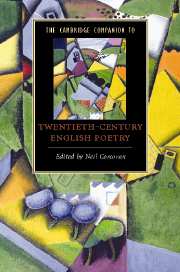6 - Wilfred Owen and the poetry of war
from Part II - Moderns
Published online by Cambridge University Press: 28 January 2008
Summary
In 'The Owl', written in February 1915, three months before he enlisted, Edward Thomas characteristically sets himself on the open road: walking at night feeling hungry, cold and tired. When he enters an inn, though, the exterior world is 'quite barred out' except for 'An owl's cry, a most melancholy cry // Shaken out long and clear upon the hill' - and shaken out too across a stanza break, a formal prolongation dramatising the owl's effect on the poet. In fact the cry is also shaken out across English literary history, since it is explicitly distinguished from the owl's 'merry note' in Shakespeare's song. For this owl carries an echoing message 'telling me plain what I escaped / And others could not, that night, as in I went':
And salted was my food, and my repose, Salted and sobered, too, by the bird's voice Speaking for all who lay under the stars, Soldiers and poor, unable to rejoice.
'Salted': seasoned, but also rendered poignant or piquant. The bird's voice, the only voice we hear in this poem of human shelter and sustenance, transforms the poet's circumstances by its insistent reminder of all who lack such things, 'soldiers and poor'.
Where the owl is insistent, however, this poet is not. 'The Owl' is merely shadowed by the symbolic properties of its eponymous bird; but this voice is a wise one too, offering exemplary but disconsoling counsel, and doing so by 'speaking for' others. And, by taking their part, by speaking in their stead, the owl obviates the need for the poet to do likewise more directly.
- Type
- Chapter
- Information
- The Cambridge Companion to Twentieth-Century English Poetry , pp. 87 - 102Publisher: Cambridge University PressPrint publication year: 2007
- 4
- Cited by

